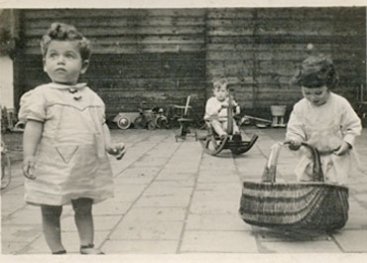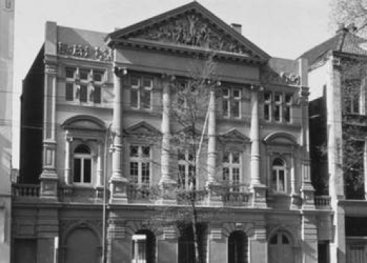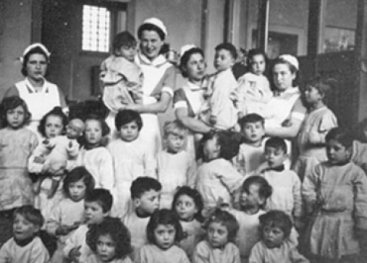
More stories
More stories
‘Our home was a real refuge. Many children went to their hiding places via my parents. I saw many strange children pass through. Sometimes they stayed for just one night, sometimes a little longer. I liked it. I always had others to play with and our box of building blocks was very popular.’
Harmen Bockma, son of the Bockma family, who provided temporary refuge for many children.
‘I was given this album by my parents in 1943 for Sinterklaas. My sister and I were in hiding separately from our parents. While we waited to go to our next address, we were allowed to be together as a family for a little while. Just the way you’re supposed to, they wrote a little verse on the first page, but they signed their false names, Hilde and Jo.’
Fietie de Vries
‘My oldest sister was in the resistance in Delfzijl. Suddenly she started to talk about a 14-month-old child that needed a place to hide. I was expecting myself. I couldn’t refuse. The baby clothes were already there and Davi could fit in them. He immediately started calling me ‘mam’.’
Mrs Apol, foster mother to David de la Penha
‘I remember mostly jolly times in Limburg. My foster family was fantastic. I always carried a rag doll, a cowboy, with me. My other toys were, like me, in hiding, but in Amsterdam.’
Max Arian
‘I was a one-month-old baby when I was moved in with ‘granddad’ and ‘grandma’ Bongers and ‘auntie’ Rie, their unmarried adult daughter. The Bongers family were Reformed and very religious. I was a real cry-baby. The neighbour, a member of the Dutch national socialist movement, one day asked: “Say, is there a baby in the house?” Granddad and grandma replied: “it’s our daughter’s little one.” For Reformed people it was a true disgrace for an unmarried woman to have a baby. So coming up with that excuse must have been very difficult for them.’
Benjamin Flesschedrager
‘The resistance group had a summer house in the woods near Nijverdal. There were a few Jewish girls in hiding there, together with Jaap Musch, one of the founders of the organisation. I also went to the summer house often; it was always very jolly there. Until the summer house was accidentally discovered. The girls were able to escape, but Jaap Musch was arrested and killed. His brother divided up his personal belongings. I was given Jaap’s silver pencil.’
Roosje Colthof
‘My parents sent a card to my uncle and aunt from Westerbork: “How is your little nephew doing? Is he behaving well?” They were obviously afraid to write “our son” because all mail was checked. Later, I stayed with a childless couple in Zaandam, the Schaap family. They were very pleased to have me.’
Max Degen
‘When I arrived at my first hiding place I was sad and confused. I eventually ended up with the Sleegers family in Bakel: a farmer’s family with a 16-year old son and a 14-year old daughter. At first I called them Mr and Mrs Seegers, later uncle Janus and aunt Engelina. Eventually it became mum and dad. I loved it there. Mum was very sweet and there was lots to do on the farm.’
André van Vlijmen
‘The photograph with the bear was taken in late August 1943, shortly before we were arrested. In the photograph with the dog, I’m already in Friesland with my foster parents. I’m wearing the same dress. You can see I’ve grown a little. My foster parents were very pleased to have me. They made me a Friesian girl. I had to completely forget that I was Jewish.’
Vera Schwarzmann
‘I ended up in Limburg, with a catholic family with six children. It was a good hiding place, but I just didn’t like the catholic religion: the praying all the time and the church. I was present during holy communion one time. All the kids were allowed to approach the priest. I also got up, but he pushed me back immediately: “No, not you.”’
Levi Hagenaar

